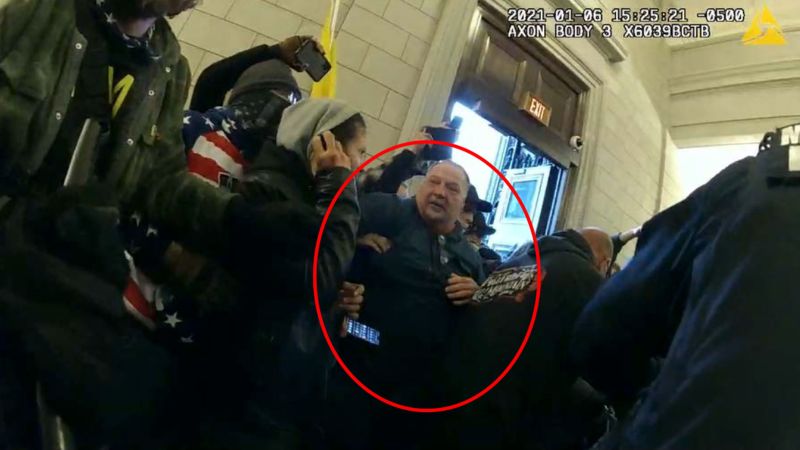A former Pennsylvania police officer, Joseph Fischer, accused of participating in the US Capitol riot is set to go to trial next year after the Supreme Court ruled on the interpretation of one of the charges he faced, obstructing an official proceeding. The Supreme Court’s ruling narrowed the scope of the obstruction law, impacting hundreds of January 6 defendants. Fischer will now face trial on other charges, including assaulting law enforcement officers and civil disorder, with the obstruction charge remaining. Fischer allegedly filmed himself entering the Capitol on January 6 and expressed violent intentions towards Democrats.
District Judge Carl Nichols set Fischer’s trial for February 2025, acknowledging the lengthy delay but expressing willingness to expedite the process if possible. Nichols had previously ruled that rioters like Fischer should not face obstruction charges based on the law’s intended purpose relating to document tampering. The Supreme Court’s decision aligned with this interpretation, prompting some Justice Department prosecutors to reevaluate cases against January 6 rioters, such as requesting to drop the obstruction charge against another rioter, Ethan Seitz. DC District Court judges have been reconsidering cases in light of the Supreme Court’s ruling, affecting nearly 1,500 rioters facing charges.
The Supreme Court’s decision in Fischer’s case and Nichols’ prior ruling emphasized the necessity for prosecutors to demonstrate how rioters impacted records or documents related to the Congressional proceeding on January 6. This requirement has led to revisions in obstruction cases against rioters and calls for hearings to reassess these cases in the DC District Court. While 259 rioters face the obstructing an official proceeding charge that was central in Fischer’s case, none of them are escaping prosecution solely due to the Supreme Court’s ruling, as they face additional charges.
Fischer’s case highlights the legal complexities surrounding the Capitol riot prosecutions and the need for a careful assessment of the charges against each defendant. The delay in bringing Fischer to trial demonstrates the challenges in navigating the legal aftermath of the events of January 6. Despite the setback, prosecutors are committed to holding rioters accountable for their actions, as evidenced by the ongoing efforts to pursue charges against those involved in the Capitol riot. The Supreme Court’s ruling has prompted a reevaluation of obstruction cases, leading to potential modifications in prosecutions to ensure justice is served.
As the legal proceedings continue and cases are reconsidered in light of the Supreme Court’s decision, it remains imperative to uphold the rule of law and ensure that those responsible for the Capitol riot are held accountable. The forthcoming trial of Joseph Fischer and the developments in other rioter cases underscore the ongoing efforts to address the consequences of January 6 and uphold the principles of justice and democracy. The judicial system’s response to the Capitol riot reflects a commitment to upholding the rule of law and ensuring that those who sought to disrupt the democratic process are brought to justice. Through continued legal action and reevaluation of cases, prosecutors are working towards holding all accountable for their actions on that fateful day.


